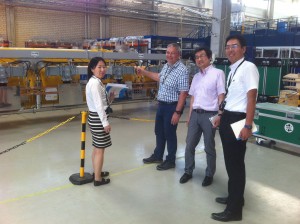
Tohoku University campus planning group at DESY (from left: Tokiko Onuki, Nick Walker, Eisaku Nashiyama, and Akihiko Nagasaka)
German national laboratory Deutsches Elektronen Synchrotron (DESY) welcomed three Japanese visitors on 30 June, 2015, who asked to be introduced to DESY – its campus and organizational structure as an example of a research institute. The group is studying the size and needs of a possible International Linear Collider (ILC) campus in Tohoku. Tokiko Onuki, Campus Designer of Tohoku University, together with Eisaku Nashiyama, General Manager of the Industry and Economy Group from Tohoku Economic Federation and also the Executive Director of the Tohoku ILC Promotion Council, and Akihiko Nagasaka, ILC Promotion Division of the Mayor’s Office at Ichinoseki City, were welcomed at DESY by Manfred Fleischer, Deputy Director of the High Energy Physics Department of DESY, and Nick Walker, Global Coordinator for ILC Accelerator Design & Integration.
A program alternating between tours around the campus and presentations by different departments of DESY was the day filling schedule which Fleischer and his colleagues presented to the Japanese visitors. The program started with a historical overview of DESY and the present status of the institute as a national laboratory with many international projects. The broad variety of topics encompassed: civil architecture and planning of the campus, needed infrastructure for a laboratory, transportation along the DESY sites (mainly during HERA times), introduction of foreign researcher’s families to life in Germany and the DESY’s social support systems, possible schools and education for researcher’s children, and regional impact of DESY in many facets of life.
Onuki was interested in different models for office space and their functionality within the research community. The ILC will need offices for resident staff, long-term guest-scientists and also short-term visitors. At DESY different models for the different groups are used which were presented to the visitors. Further needs concerning seminar rooms and other equipment was addressed and also well received by the visitors.
Of course an institute for the ILC needs more than office buildings. A tour through workshops and a look inside the cavity testing facility AMTF was part of the visit at DESY. “Such a facility like AMTF or even bigger will be needed for the building phase of the ILC.” was a statement from Nick Walker during the tour through AMTF. The ILC will use the same accelerating technology but it has 20 times as many accelerating structures than the European XFEL (which already needed a mass production). Here additional space and planning for the necessary mass production of accelerating structures is needed for the ILC campus. Walker could give many important insights about the ongoing European XFEL production as stepping stones for the ILC.
Campus transportation of equipment and personnel will also be an issue for the possible site of the 30km long ILC with all buildings and needed infrastructure. “A good number of bicycles are in use at DESY but they also need maintenance and parking space.” was one of the first answers which were given by Fleischer. DESY solved some of the issues of transportation on campus site by using bicycles, installing a car pool (including transport vans) and during the time of the use of the HERA accelerator a bus shuttle was provided towards the experimental halls. Onuki and their colleagues were interested in all those solutions and of course how these things are used and received within DESY staff.
Steffi Killough, Leader of the International Office at DESY, was giving helpful insights about social support which would be needed for foreign researchers and their families. DESY supports the guest-scientists starting with the visa application until the end of their stay in the country. Especially the tax system, insurances and other legal matters need explanations and advising. Also the education system for children is an important topic to visiting scientists and support for the integration into those systems needs to be provided. This issue is also very important for the ILC and its possible host nation Japan. “What would you like to provide if you had more resources?” was one of the questions from Onuki and her colleagues. Here the answer was very clear to Killough: more time which can be dedicated to provide support for each individual, also to provide more language support to address a greater variety of visitors in their native language, and to organize more social events.
At the end of the day many other topics had been addressed like: scientific outreach, visitor numbers to DESY on open house days and the cooperation with the University of Hamburg and other Universities. “A key factor in the 50 year history of DESY was a close collaboration between Hamburg University and DESY, which has grown over the years.” is one of the statements of Frank Lehner towards the visitors from Tohoku University.
Also the regional impact of DESY towards Hamburg was detailed and discussed in all areas like economy and education. The possibility for spin-off companies, regional investment for the needed infrastructure, training of skilled personnel in a variety of professions which are needed to provide the support system of a laboratory and growth for the regional economy were also further topics of the discussions.
The Campus Planning Group from Tohoku University was given as many answers as possible from DESY in all possible areas to assist with the future ILC campus plans.

Recent Comments